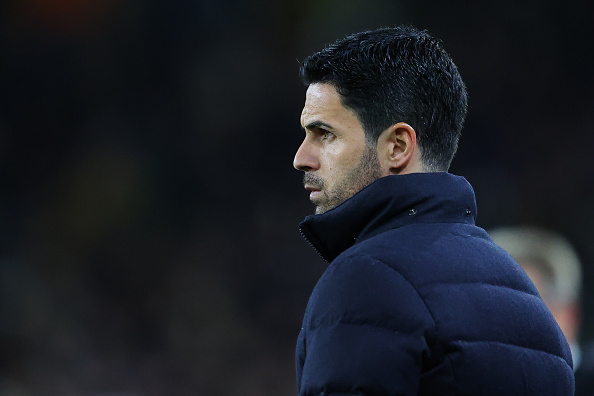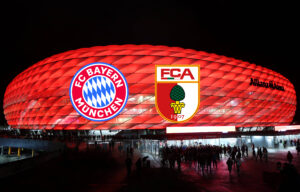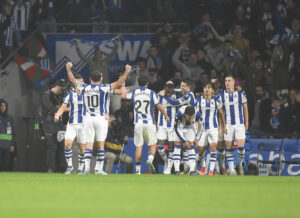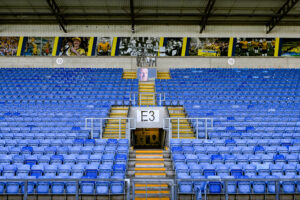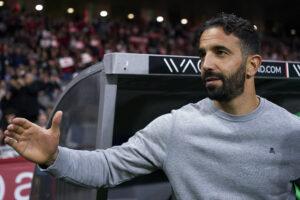As opening night disasters go, it wasn’t quite The Rite of Spring, which literally caused a riot when it premiered in in Paris 1913. Nevertheless, Arsenal’s opening night defeat to Brentford right at the start of the season, which was actually the first game of the Premier League season, almost caused a riot among Arsenal fans, who were horrified by the team’s limp display in losing to a newly promoted side 2-0, with some even demanding that manager Mikel Arteta should lose his job. Now, more than six months on, Arsenal’s rematch with Brentford at The Emirates this weekend offers the Gunners and Arteta himself the perfect opportunity to show just how far they have progressed since then.
Brentford Rematch Offers Arsenal Chance of Revenge
All of Arsenal’s Problems Were on Display at Brentford
All of Arsenal’s and indeed Arteta’s long-standing problems appeared to be on display in that opening night defeat. The main charge against the Gunners and their manager was that they appeared to be entirely unprepared for what was a completely predictable onslaught by a newly promoted team, playing its first game in England’s top flight for more than 70 years and effectively opening their new stadium in style after 18 months of Coronavirus-caused disruption. Only Arteta and Arsenal, it seemed, had no idea that the match would be more like a one-off cup game, especially under lights, than a relatively routine Premier League match. Consequently, Arsenal’s manager and his team seemed to be caught completely cold, despite having had more than a month to prepare for the game after the fixture list had been published.
Check out our new Saka shirt!

Arsenal were undoubtedly missing key players that night, notably their first-choice attack, after Pierre-Emerick Aubameyang and Alexandre Lacazette were both ruled out because of Covid, and Bukayo Saka was given extra time off to recover from the rigours of playing at the delayed Euro 2020 and in particular the pain of missing a penalty in the decisive, tournament-deciding shootout. None the less, Arsenal were particularly poor offensively, barely creating a chance of any note, with the much-hyped Folarin Balogun, who was pressed into service because of the absence of other forwards, doing little or nothing to justify that hype.
However, even worse was Arsenal’s defence, with new £50 million signing Ben White appearing to be bullied by the Brentford forwards and proving particularly poor when a long Brentford throw led to their second goal. For many Arsenal fans who were watching that night, it seemed that the club had learned nothing since the long throws of Stoke’s Rory Delap a decade or so earlier, and that White was just the latest in a long line of centre-backs – including Philippe Senderos, Per Mertesacker and the original Gabriel – who were unworthy of comparison with Arsenal’s greatest defenders, from Eddie Hapgood in the 1930s to Sol Campbell in the early noughties.
Nevertheless, for all the failings of the Arsenal team, most focus was on Arteta, their manager, because the Brentford game seemed to expose, yet again, all the lack of forward planning, motivational ability and even ruthlessness that seemed to be characterising his tenure at The Emirates. By trying, but failing, to have the game postponed because of Arsenal’s Covid absences and injury problems, Arteta seemed to be emphasising once again that he was utterly out of his depth as the manager of the Gunners. And when Arsenal proceeded to lose their next two Premier League games, to Chelsea and Manchester City, conceding seven goals and not scoring any themselves, it seemed like the writing was on the wall for Arteta at Arsenal.
Six Months on, Progress Has Been Made
Six months on from the Brentford debacle, it is surely unarguable that Arteta has made considerable progress at Arsenal. For one thing, the loss to a newly promoted side seemed to prove to him conclusively that his existing squad was just not good enough to fulfil his ambition of at least improving upon the two eighth places that Arsenal had achieved under him in the two previous pandemic-disrupted seasons. As a result, he and Edu, Arsenal’s new technical director, went into what was left of the summer transfer market with renewed vigour, effectively refashioning a completely new defence with some inspired signings.
When Aaron Ramsdale was signed from Sheffield United after he had experienced a second successive relegation from the Premier League (he had also gone down with Bournemouth the season before), it initially seemed that Arteta and Edu had completely lost their minds. Only Arsenal, it was said, would spend so much money – up to £30 million in total – on a back-up goalkeeper, when they already had a competent No.1 in Bernd Leno, and such money should have been spent elsewhere. Within weeks, however, Arteta and Edu’s judgement was completely vindicated, as Ramsdale not only replaced Leno in the Arsenal goal but threatened to replace Jordan Pickford as England’s No.1. It was a further reminder, if it was needed, that Brian Clough was right all those years ago when he said that signing Peter Shilton for a then record British transfer fee was the key to creating his League and European Cup-winning side at Nottingham Forest. Ramsdale obviously has a long way to go to match the legendary feats of Shilton, but his impact at Arsenal has already been almost as transformative as that of Shilton at Forest.
Similarly, Takehiro Tomiyasu was signed for an initial £16 million from Bologna. Then, some Arsenal fans joked that he was the latest in the long line of great Japanese defenders. Now, after he has made the right-back position his own, it looks like he might be the start of a long line of great Japanese defenders, who might be inspired by his achievements in the Premier League to combine defensive power and nous with attacking pace and grace.
However, the biggest improvement in the Arsenal defence has undoubtedly been in the performances of Ben White. Exposed at Brentford, on a night when the whole Arsenal team looked as if they were newcomers to it, he has since forged one of the most impressive centre-back partnerships in England with Gabriel, and together they have provided the central defensive solidity that has been lacking from Arsenal for so many years. That was particularly evident in the defensive shutouts that the Gunners achieved recently at both Liverpool and Wolves, despite going down to 10 men in both games.
Finally, with a vastly improved defence (including goalkeeper), Arteta himself seems far more assured and self-confident than the hesitant, even nervous, version of himself that he presented at Brentford. That was probably most evident when he successfully lobbied for Arsenal’s Premier League game with Spurs at the start of this year to be called off because of Arsenal’s Covid absences. On that occasion, it seems, he was far more determined that he would get his way and, much to Antonio Conte’s shock and disappointment, he did.
But Problems Remain at Arsenal
However, it wouldn’t be Arsenal, or at least the version of the club that has been largely in evidence since the Invincibles season of 2003-04, if there weren’t still major problems for the club to contend with. The most significant of those are in attack. Ironically, for all their improvements in defence, Arsenal will still start the home game against Brentford with a fairly feeble attack, and on this occasion it will not be because of Covid or injuries but because of the club’s action, or lack of it, in the January transfer window.
Aubameyang, after completely falling out with Arteta because of the striker’s poor time-keeping, has of course left Arsenal, but he was not replaced in January and cannot be replaced until the summer transfer window. In Aubameyang’s now-permanent absence, Arteta only has two first-choice central strikers to choose from, Lacazette and the still-inexperienced Eddie Nketiah, and it remains doubtful that either of them can score the eight to 10 goals that the Gunners will surely need from one player if they are to challenge successfully for the top four and Champions League qualification. Consequently, the onus will be on Arsenal’s other attackers – their attacking midfielders and wingers – to up their own goal-scoring ante. However, that will not be easy, especially in the absence of arguably the best of them, Gabriel Martinelli, after his sending-off against Wolves last week.
It is almost certain that Brentford, who have been on a poor run of form themselves in 2022 (losing six games in a row in all competitions before a goalless home draw in the Premier League against Crystal Palace last weekend) will sit deep against Arsenal, or, to use the modern parlance, “adopt a low block”. It is exactly that kind of low-lying, deep-sitting defence that Arsenal have so often struggled against in recent seasons, including at home, so it will be vital that the Gunners get the early goal that would force Brentford to come out and play and thereby open up more space for themselves to attack in.
At the moment, because Arsenal did not qualify for Europe last season and have been knocked out of both domestic cups in the last month or so, the Gunners appear to be playing only about once every two weeks or so, much to their fans’ frustration. Although that allows for greater preparation each match, it also places even greater significance on each match, especially with the fight for Champions League qualification proving so fierce. As a result, Arsenal’s rematch with Brentford will not only be important in terms of avenging their opening night defeat at the start of the season but in terms of maintaining their challenge for the top four. Win and they can look forward to the end of the season with genuine confidence; lose or draw and the progress since the Brentford match six months ago will no longer seem quite so impressive.
Main Photo
Embed from Getty Images


